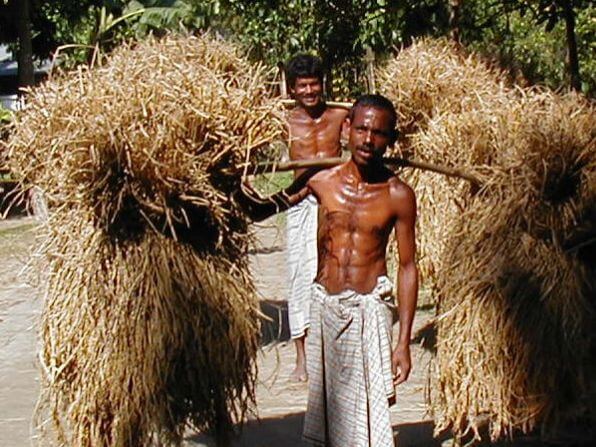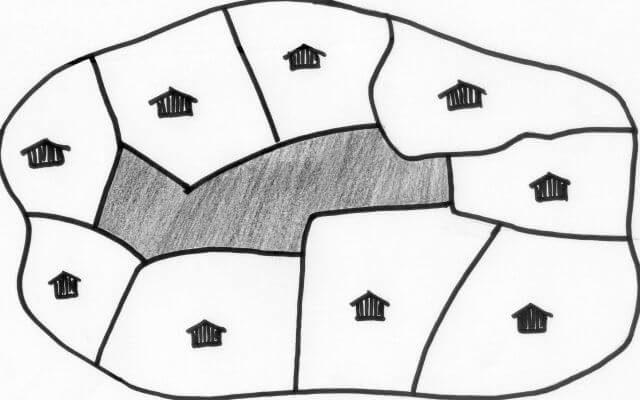ECONOMY 08 – POVERTY ALLEVIATION
Lev 19:9-10 Leave the edges, leftovers, gleanings
“When you reap the harvest of your land, you shall not reap to the very edges of your field, or gather the gleanings of your harvest. You shall not strip your vineyard bare, or gather the fallen grapes of your vineyard; you shall leave them for the poor and the alien: I am the LORD your God.”
Deu 24:19-22 Leave the leftovers, gleanings
“When you reap your harvest in your filed and forget a sheaf in the filed, you shall not go back to get it; it shall be left for alien, the orphan, and the widow, so that the LORD your God may bless you in all your undertakings. When you beat your olive trees, do not strip what is left; it shall be for the alien, the orphan, and the widow. When you gather the grapes of your vineyard, do not glean what is left; it shall be for the alien, the orphan, and the widow. Remember that you were a slave in the land of Egypt; therefore I am commanding you to do this.”

- Examples are those of a typical agricultural society
- Grain, oil, wine are the main crops of Israel, staple foods, the essentials for survival. In Bangladesh this would be dal, bhat, torkari.
What is God commanding?
- leave edges of fields standing
- leave what you forgot or what fell out
- trees: do not strip bare (= do not take what was unripe or what didn’t fall down at the principal harvest)
- vines: do not gather what fell down on its own but take main crop off branches
What does this mean?
- The farmer, as the owner of the land and the one who invested labor has the right to the main crop in an affirmation of ownership, laborer and labor.
- But also: don’t be stingy or greedy, leave the rest, think of others
1st Question: Who is entitled to help?
- Poor and alien (Leviticus). Alien, orphan, widow (Deuteronomy).
What do these 4 groups have in common?
- difficult situation through no fault of their own (mostly)
- they have little protection, power, opportunity
- they are young (orphans), left alone (widow), not informed or connected (alien), the most vulnerable of a society, those most likely to have their rights taken away or overruled.
- they are not likely to own land, or have lost land due to their weak position
- so they have limited opportunities and little power to change circumstance
Who else would fit this group?
- disabled? mentally ill? old? Those who don’t own land or can’t labor?
- Who is not entitled to help?
- lazy able-bodied people, people that have land, options, opportunities
- We must make a difference between those worthy and not worthy of help
- Why? What if I do not make a difference?
- We encourage laziness and irresponsi-bility (why work if I can get the same sitting and begging?)
- We frustrate the hardworking & faithful
- I create more and more ‘poor’.
2nd Question: What exactly is given?
Money? Crop? Food?
- Actually: the opportunity to feed themselves.
What do the beneficiaries need to do in order to get this benefit?
- the same everybody else does: work, reap, gather, thresh, cook.
- utilize (or develop) necessary skills
- taking initiative and responsibility
Our ‘help’ must encourage:
- hard work self-initiative
- self-responsibility using or developing of skills
- independence long-term thinking
‘Help’ must produce:
- dignity of taking care of oneself less dependency
- training for a different life skill development
- If our help does not encourage this, our ‘help’ is no help.
Worse, it produces what is wants to end:
- dependency irresponsibility
- paralysis, laziness inability
- blaming others more ‘poor’, more poverty
Societal Pressure of Accountability
- What if somebody comes and begs?… “I just harvested olives, you can go to my olive orchard and glean”.
- > As long as there are unused opportunities out there, I have no right to beg.
- Principle: There needs to be some pressure or system of accountability to ensure good use of opportunities given.
Summary of Principles
- differentiate who is worthy of help
- help means to create opportunity to feed oneself
- encourage hard work, self-initiative, responsibility, skill development
- pressure, accountability needed
Principles are essential, application may differ
- Understand the law rightly: Principle more important than letter of the law.
- The commands in Leviticus and Deuteronomy are different, the beneficiaries mentioned vary, the crops this applies to vary, the exact instructions vary … but the heart and principle is the same.
- Illustration of a different system that operates on the same principles:
- Switzerland till 100 years ago (agricultural society): every village had “common land”, that could be allotted by village council to families in special need for a limited amount of time.
- Example: one family lost their crops in a fire, or lost livestock to a disease (worthy of help). Then the village council would agree to give this family the ‘common land’ for 3 years (opportunity given) > if the family works hard, they can get much higher income (hard work, self-initiative). But if the common land is not farmed properly, everybody will see and object (accountability).
- The principles are eternal, but the application to situation can look different

How could we apply these principles in a modern day urban slum?
- Example: Rickshaw garage with eventual pay-off > driver becomes owner
- Example: Sewing training > saving of mojuri earned till machine is paid off
- Example: Micro credit for small business > revolving fund
- Example: loaning cows > milk production & income > young calves
Biblical Example ‘Ruth’
The story of Ruth is a beautiful example of this law lived out in the village Bethlehem
- Naomi (a widow) and Ruth (a widow and foreigner) are entitled to the opportunity of gleaning in harvested fields.
- Ruth exercises self-initiative, thankfulness, staying within given limits and hard work and is able to provide for herself and for her mother-in-law. She has dignity and is treated with respect.
Biblical command to work for those who are able
- To be able to work but not work and rather expect others to feed oneself is definitely not condoned in the Bible. Paul says to the Thessalonians:
1 Thess 4:11 “We urge you … to aspire to live quietly, to mind your own affairs, and to work with your hands, as we directed you, so that you may behave properly toward outsiders and be dependent on no one.”
2 Thess 3:10 “Anyone unwilling to work should not eat.”
Some further support systems for the poor in the Old Testament
- Giving interest free loans to needy neighbors (Deu 15:7-11)
- 7 year time limits on debts that can’t be paid back (Deu 15:1-3)
- 7 year system of bonded labor and start up capital on release (Deu 15:12-18)
- Land reverting to original owners every 50 years (Lev 25:8-55)
- Tithe every 3 years given to not only Levites but also to the poor (Deu 26:12-15) …
Problems with modern welfare states
US poverty fighting efforts in 1776 – 1850 AD were lead by Biblical principles:
- poor are worthy of help.
- humans are sinful, fallen and will make poor choices. Therefore there is a need for discernment, categorization who is worthy of relief and accountability.
- first line of help is one’s own family, then small local communities, not the central government to ensure individually tailored help, personal relationship with the poor person, accountability.
From 1850 AD onward with the influence of the enlightenment these principles were increasingly abandoned:
- Government becomes the giver of poverty alleviation.
- Big schemes, non-personal, no distinction between those worthy of relief or not > ‘soup kitchens’, ‘handouts’, talk of ‘structural inequality’.
- Sense of ‘shame’ and ‘self-responsibility’ was discouraged, rather: ‘I have a right to be helped by government’ and ‘the rich owe me’.
- Results of this: ever increasing number and percentage of poor people in society, frustration of givers and generosity, exploding Social Welfare costs.
- Example of the US spending on Social Welfare (www.ssa.gov):
- 1930 2% of GNP spent on social welfare
- 1950 9% of GNP spent on social welfare
- 1960 10% of GNP spent on social welfare
- 1970 15% of GNP spent on social welfare
- 1980 18 % of GNP spent on social welfare
- Aid to Families with dependent Children (AFDC) in the US (Scott Allen, FHI):
- 1950 6.47 lac families receiving support
- 1960 7.57 lac families receiving support +17%
- 1970 15.57 lac families receiving support +107%
- 1974 108 lac families receiving support +690%
- In summary: In spite of ever increasing spending on poverty alleviation, there are a higher percentage of poor each year!
- The chief reason for modern Western nations to have great national debts besides military spending is Social Welfare.
Wrong ideas about ‘help’
- More money will solve the problem of poverty. If money really could buy development, Bangladesh would be the most developed nation of all.
- Denis Peacocke: “I was continually amazed at the poor choices the poor made.”
- Example of poor Asian immigrants in Jamaica becoming plantation owners in 2-3 generations while the indigenous Jamaicans are still doing subsistence farming. What is the difference? Not environmental conditions (they shared that). Rather: Mindset and work ethic.